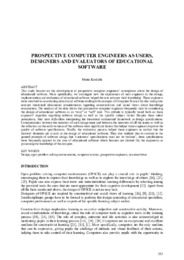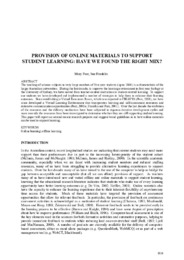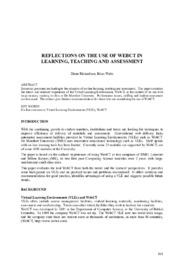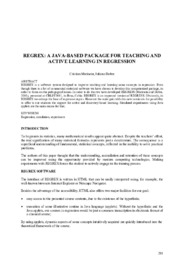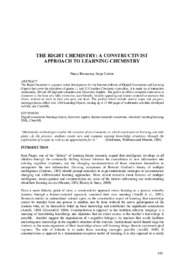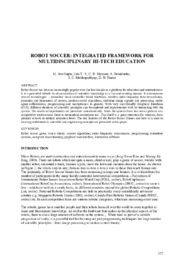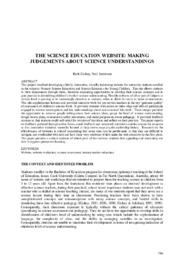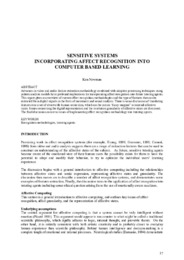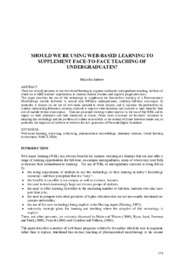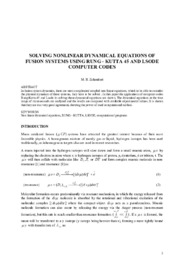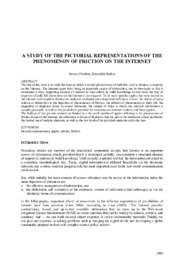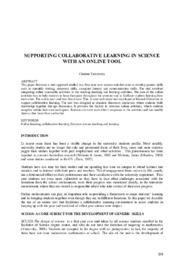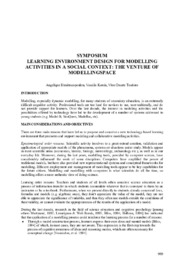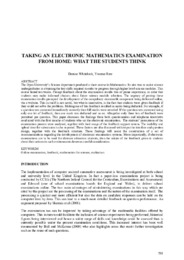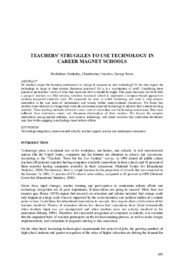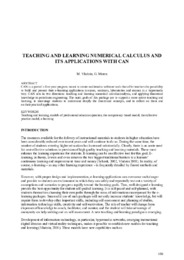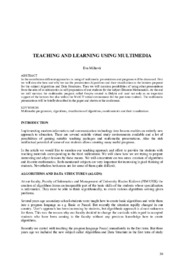Browsing CBLIS Conference Proceedings 2003 Volume I: New Technologies and their applications in education by Title
Now showing items 81-100 of 120
-
Prospective computer engineers as users, designers and evaluators of educational software
(Department of Educational Sciences, University of Cyprus, 2003)This study focuses on the development of prospective computer engineers’ conceptions about the design of educational software. More specifically, we investigate how the experiences of such engineers in the design, ... -
Provision of online materials to support student learning: have we found the right mix?
(Department of Educational Sciences, University of Cyprus, 2003)The teaching of science subjects to very large numbers of first year students (up to 1800) is a characteristic of the larger Australian universities. During the last decade, to improve the learning environment in first ... -
Reflections on the use of webct in Learning, teaching and assessment
(Department of Educational Sciences, University of Cyprus, 2003)Economic pressures are leading to the adoption of on-line learning, teaching and assessment. This paper considers the tutors' and students' experience of the Virtual Learning Environment, WebCT, in the context of its use ... -
Regrex: a java-based package for teaching and active learning in regression
(Department of Educational Sciences, University of Cyprus, 2003)REGREX is a software system designed to improve teaching and learning some concepts in regression. Even though there is a lot of commercial statistical software we have chosen to develop this computerized package, in order ... -
The right chemistry: a constructivist approach to learning chemistry
(Department of Educational Sciences, University of Cyprus, 2003)The Right Chemistry is a project under development for the Internet delivery of Digital Courseware and Learning Objects that cover the objectives of grades 11 and 12 Canadian Chemistry curriculum. It is made up of interactive ... -
Robot soccer: integrated framework for Multidisciplinary hi-tech education
(Department of Educational Sciences, University of Cyprus, 2003)Robot Soccer has become increasingly popular over the last decade as a platform for education and entertainment. It is a powerful vehicle for dissemination of scientific knowledge in a fun and exciting manner. It encompasses ... -
The science education website: making Judgements about science understandings
(Department of Educational Sciences, University of Cyprus, 2003)This project involved developing a lively, interactive, visually interesting website for university students enrolled in the subjects: Primary Science Education and Science Education for Young Children. This site allows ... -
Sensitive systems Incorporating affect recognition into Computer based learning
(Department of Educational Sciences, University of Cyprus, 2003)Advances in video and audio feature extraction methodology combined with adaptive processing techniques using pattern analysis models have profound implications for incorporating affect recognition into future tutoring ... -
Should we be using web-based learning to supplement face-to-face teaching of undergraduates?
(Department of Educational Sciences, University of Cyprus, 2003)There are several pressures to use web-based learning to augment traditional undergraduate teaching, not least of which are to fulfil students’ expectations, to increase student retention and improve progression rates. ... -
Simulations, applets and learning in schools
(Department of Educational Sciences, University of Cyprus, 2003)This paper reviews the problem of establishing learning effects with computer simulation packages in science teaching. It is stated that evidence is accumulating about the effects of simulations in a laboratory environment ... -
Solving nonlinear dynamical equations of Fusion systems using rung - kutta 45 and lsode Computer codes
(Department of Educational Sciences, University of Cyprus, 2003)In fusion system dynamics, there are most complicated coupled non-linear equations, which to be able to consider the physical dynamics of these systems, they have to be solved . In this paper the applications of computer ... -
Solving some physical problems using the methods of numerical mathematics with the help of system mathematica
(Department of Educational Sciences, University of Cyprus, 2003)Every future teacher of mathematics must know symbolic approaches, for example, for finding derivations and integrals, solving algebraic and differential equations very well. But most of the problems from practice are not ... -
A study of the pictorial representations of the phenomenon of friction on the internet
(Department of Educational Sciences, University of Cyprus, 2003)Τhe aim of this work is to study the ways in which a natural phenomenon of daily life, such as friction, is depicted on the Internet,. The Internet, apart from being an important source of information, can be developed so ... -
Supporting collaborative learning in science with an online tool
(Department of Educational Sciences, University of Cyprus, 2003)This paper discusses a new approach trialled in a first year core science unit that aims to develop generic skills such as scientific writing, numeracy skills, computer literacy and communication skills. The trial involved ... -
Symposium Learning environment design for modelling activities in a social context: the venture of modellingspace
(Department of Educational Sciences, University of Cyprus, 2003) -
Taking an electronic mathematics examination from home: what the students think
(Department of Educational Sciences, University of Cyprus, 2003)The Open University’s Science department produced a short course in Mathematics. Its aim was to assist science undergraduates in obtaining the key skills required in order to progress through higher level science modules. ... -
Teachers’ struggles to use technology in career magnet schools
(Department of Educational Sciences, University of Cyprus, 2003)Do teachers expect the learning environment to change in response to new technology? Or do they expect the technology to adapt to their routine classroom practices? Or is it a combination of both? Underlying these questions ... -
Teaching and learning numerical calculus and Its applications with can
(Department of Educational Sciences, University of Cyprus, 2003)CAN is a part of a five-year program meant to create multimedia software tools that offer teachers the possibility to build and present their e-learning applications (courses, seminars, laboratories and exams) in a hypermedia ... -
Teaching and learning using multimedia
(Department of Educational Sciences, University of Cyprus, 2003)In the contribution different approaches to using of multimedia presentations and programs will be discussed. First we will describe how and why we use the presentation Algorithms and their visualisation in the lectures ... -
Teaching logic programming from a distance: an approach
(Department of Educational Sciences, University of Cyprus, 2003)In this paper a Networked Learning environment is presented for teaching Logic Programming from a Distance. After a short introduction to the Networked Learning approach to Open and Distance Learning, we present the reasons ...
